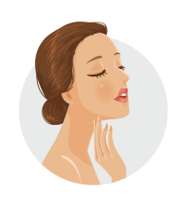Doctor, Why Do I Have Grey Hair at Just 20? Let’s Dive into Premature Greying!
October 16, 2023 2023-10-16 9:57As an Amazon associate, Dermatocare earns from valid purchase made by clicking on the affiliate links in this blog.

Doctor, Why Do I Have Grey Hair at Just 20? Let’s Dive into Premature Greying!
“
You may be wondering why, at just 20 years old, you’re starting to see grey hair. Premature greying can be quite perplexing, and it’s a question that frequently lands on my desk in the dermatology clinic. So, what exactly causes your hair to turn grey prematurely, and what treatments do dermatologists recommend for this common concern?
The Science Behind Grey Hair:
Before we delve into the causes and treatments, let’s understand what’s happening at a biological level. Your hair turns white due to a decrease in melanin, the pigment responsible for giving your hair its black or brown color. When black and white hairs intermingle, you get that distinctive grey hue.
Premature Greying – What’s the Deal?
Dermatologists typically classify grey hair as premature if it appears before a certain age, which varies based on skin type:
- Fair Skin: Before 20
- Wheatish Skin: Before 25
- Black Skin: Before 30
If you’re experiencing grey hair in your twenties or thirties, it’s definitely worth some attention. Let’s explore the causes, treatments, home remedies, and more surrounding premature grey hair.
Dive Deeper with a Quick Video:
For those of you on the go, I’ve got you covered. In the video linked below, I’ve highlighted the key points for your convenience.
What Triggers Premature Greying?
While the internet is full of potential culprits for premature greying, I’ll focus on those with solid evidence from dermatological literature. Let’s take a look:
Nutritional Factors:
Nutritional deficiencies are a common cause of early greying. Numerous studies highlight significantly low levels of key nutrients, including calcium, iron, vitamin B12, folic acid, vitamin D3, ferritin, and copper.
Hereditary Influence:
Premature greying often runs in families, as it’s inherited as an autosomal dominant trait. If your parents, siblings, or close relatives had grey hair at an early age, your genes might be to blame. Unfortunately, treatment may not completely reverse this genetic predisposition.
Allergic Tendencies:
Individuals with allergies tend to grey prematurely, and these allergies can manifest in various forms, including asthma, allergic conjunctivitis, allergic rhinitis, and atopic dermatitis.
Autoimmune Disorders:
Those with autoimmune diseases like pernicious anemia or hyper- or hypothyroidism may also experience premature greying.
Premature Aging Syndromes:
Progeria and Pangeria are rare conditions that cause premature greying, often accompanied by other signs of accelerated aging like facial wrinkling, weakened bones, diabetes, and cataracts.
Excessive Stress:
Daily stress is unlikely to turn your hair grey, but excessive physical and mental stress can contribute to premature greying.
Medications:
Certain medications, such as chloroquine, mephenesin, phenylthiourea, triparanol, fluoro butyrophenone, dixyrazine, epidermal growth factor receptor inhibitors, and interferon-alpha, can lead to premature greying.
Medical Conditions:
Premature greying can also be associated with diseases like HIV infection, cystic fibrosis, and Hodgkin’s lymphoma.
Smoking and Substance Abuse:
Research has shown a correlation between smoking, drug abuse, and early greying of hair.
Environmental Damage:
Environmental factors like pollution, UV rays from the sun, chemicals in hair care products, and an increase in pesticides and insecticides can accelerate the greying process. These factors generate damaging reactive oxygen radicals, leading to premature greying, aging, and various other health issues.
Scalp Diseases:
Inflammatory scalp conditions such as psoriasis and lichen planus can harm the pigment-forming cells in your hair, resulting in premature greying.
Lifestyle Matters:
Lifestyle plays a pivotal role in triggering premature greying. In recent times, unhealthy lifestyles, stress, and exposure to environmental chemicals have contributed to an increase in premature greying cases. Our patients have witnessed remarkable results by making the lifestyle changes outlined in this article.
Protect Your Grey Hair:
Heat, sun, and harsh chemicals can further damage grey hair. To protect your silver locks, consider the following tips:
- Avoid excessive blow-drying. Opt for air-drying, which is gentler on grey hair.
- Limit the use of hot irons for straightening, as heat can make grey or white hair frizzier.
- Steer clear of frequent hair wax applications, as they can damage your hair.
- Be cautious with straightening procedures, as the chemicals involved can trigger greying and harm pigment-forming cells.
- Understand that shampoos or spa treatments won’t darken greys.
- Shield your grey hair from bright sunlight with a cap, scarf, or bandana. Grey hair lacks melanin and is susceptible to damage from UV rays.
Hair Coloring Tips for Grey Hair:
If you’re looking to give your grey hair a makeover, here are some precautions and suggestions to keep in mind:
- Professional salon coloring is often more effective than multiple attempts at home.
- Ensure that hair dye doesn’t come into contact with your scalp.
- Consider getting highlights to limit the exposure of hair color to your natural hair.
- Space out your coloring sessions to minimize frequent exposure to hair dye. Studies have suggested a link between excessive hair dye use and cancer.
Dermatologist-Recommended Products for Premature Grey Hair:
For those who prefer a more natural approach, there are options worth exploring. Natural hair colors may not completely cover greys but can offer a subtle change. These products often contain ingredients like heena, amalaki, bhringaraj, mooncake seed tree, lotus tree, and indigo. Check out recommended natural hair color products:
RECOMMENDED NATURAL HAIR COLOR
India: https://amzn.to/3CyUP3S
United States: https://amzn.to/3ThAJRE
United Kingdom: https://amzn.to/3KoXq2d
Home Remedies for Grey Hair:
If you’d like to try home remedies to prevent or color your grey hair, here are a few options:
Coconut Oil and Curry Leaves: Soak curry leaves in coconut oil for three weeks or boil them for 5-10 minutes at a low temperature. This mixture may help darken grey hair.
Tea for Black Color: Cooking tea in water, straining it, and using the cold mixture to rinse your hair can provide temporary black coloring.
Coffee for Brown Color: Boil coffee in water, strain, and use the cold mixture to rinse your hair for a temporary brown shade.
Henna: Henna is a natural hair color that can give red highlights to black hair, although it may turn white or grey hair slightly orange. You can create a paste by mixing henna with water boiled with tea or coffee. Henna is known for its low risk of causing allergic reactions.
Vitamins for Grey Hair:
A consultation with a dermatologist begins with identifying the root cause of your premature grey hair. They may order blood tests to check levels of iron, folic acid, copper, vitamin B12, vitamin D3, and thyroid hormones. If a nutritional deficiency is the primary cause of your grey hair, you can prevent new grey hairs from appearing by addressing these deficiencies. However, existing grey hair cannot be re-pigmented. To support this process, you may need to take multivitamins and specific supplements for a few months.
Is Premature Greying Linked to Bone or Heart Diseases?
While scientific studies haven’t definitively proven a strong correlation, there is evidence suggesting that people with premature greying of hair may be more susceptible to:
- Osteopenia (low bone density) in later life, which can increase the risk of fractures.
- Coronary artery diseases (heart attacks), particularly in men with premature greying, although this correlation doesn’t seem to hold true for females. Maintaining a healthy lifestyle and discussing your health with a medical professional remains crucial.
In Closing:
I hope this article has shed light on the perplexing issue of premature greying. If you still have unanswered questions or concerns, don’t hesitate to consult a dermatologist. They can provide personalized guidance and solutions tailored to your specific needs.”
ROUTINE FINDER
Get free dermatologist-recommended regime by choosing your skin or concerns.

FACE

HAIRS

CHILD

BODY
